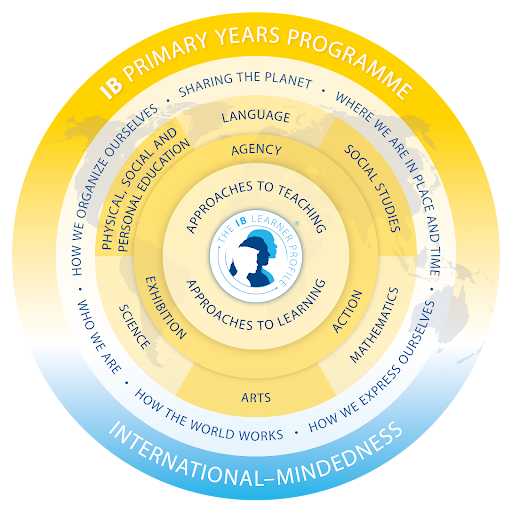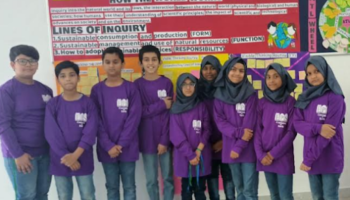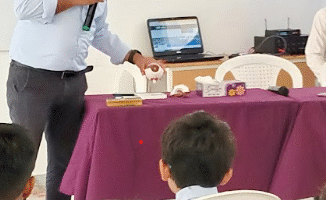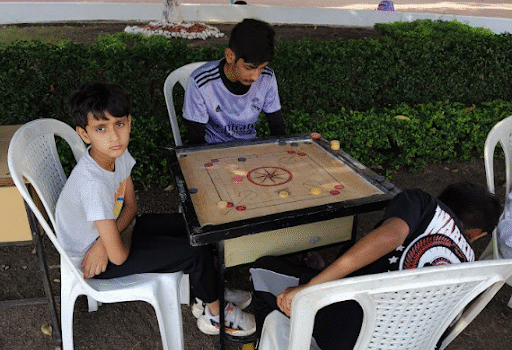Primary Years Programme
The IB Primary Years Programme (PYP) is an inquiry-based, transdisciplinary educational framework for children aged 3 to 12. It nurtures the intellectual, social, and emotional development of young learners by encouraging exploration, reflection, and action. Centered around six global themes, the PYP integrates subject areas to build conceptual understanding and promote international-mindedness. Students are empowered as active participants in their own learning, developing key skills, attitudes, and the attributes of the IB Learner Profile. The PYP prepares students to become caring, knowledgeable, and lifelong learners who contribute positively to their communities and the wider world.

© International Baccalaureate Organization 2024
Why Choose the PYP at EPS?
The IB Primary Years Programme (PYP) offers a unique, future-focused approach to education for children aged 3–12. Unlike traditional programs that often emphasize memorization and isolated subjects, the PYP develops the whole child as an inquirer, nurturing curiosity, agency, and global citizenship.
Inquiry-Based Learning
Students explore real-world questions, encouraging deep understanding and critical thinking beyond memorizing facts.
International-Mindedness
Students learn to appreciate diverse cultures and perspectives, seeing themselves as responsible, active and competent global citizens.
The IB Learner Profile
The PYP shapes students into principled, open-minded, and reflective individuals who care about making a positive difference to this world.
Transdisciplinary Approach
Learning is connected across subjects through six global and seamless transdisciplinary themes, helping students make meaningful real-world connections across different faculties.
Student Agency
PYP students actively take ownership of their learning, setting goals, reflecting, and turning their learning into meaningful action within their communities.
Ongoing, Authentic Assessment
Assessment is continuous and embedded in learning, empowering students to self-assess, seek feedback, and grow as independent learners.
At EPS, the PYP builds confident, compassionate, and capable young people who are ready to thrive in an ever-changing world.
International Mindedness at EPS
What Is International-Mindedness?
International-mindedness is a way of thinking, being, and acting that reflects openness to the world and a deep understanding of our interconnectedness. It means respecting other cultures, valuing diverse perspectives, and working collaboratively to make the world a more peaceful and sustainable place.
How We Foster International-Mindedness at EASTERN PUBLIC SCHOOL
At EPS, international-mindedness is at the heart of everything we do. As an IB Primary Years Programme (PYP) school, we are committed to developing internationally minded learners who recognize our shared humanity and understand their responsibility as global citizens.
Our school community actively nurtures international-mindedness through a range of experiences that help students grow in awareness, understanding, and action:
Learner Profile at the Core
The IB Learner Profile underpins our curriculum, shaping students into caring, principled, open-minded individuals who communicate thoughtfully and act with integrity. These attributes are integrated into all aspects of school life, from classroom activities to playground interactions.
Students are encouraged to be inquirers, thinkers, reflective, and caring, while making ethical decisions and contributing positively to the community. Through collaborative learning and real-world connections, they develop empathy, respect for others, and the ability to communicate and act with integrity, preparing them to be compassionate, responsible global citizens.
Inquiry Into Global and Local Issues
Our Units of Inquiry are designed to spark curiosity and develop deep understanding of the world around us. Students explore a wide range of globally significant issues that matter to them and to the wider world, such as Sustainability, Peace, conflict, and resolution, Equity, diversity, and inclusion, Migration, refugees, and global citizenship, Biodiversity and endangered species, Food security and responsible consumption, Digital citizenship and media influence, global governance and decision-making, Well-being, Energy use and renewable resources, Cultural identity and heritage.
These inquiries allow students to connect their personal experiences with global contexts, encouraging them to see themselves as active participants in a larger, interconnected world. Through this process, they develop compassion, critical thinking, and a sense of responsibility toward others and the planet. Each inquiry becomes an opportunity to build international-mindedness, empowering students to take thoughtful action and contribute to a better, more peaceful world.
Embracing Cultural Diversity
We celebrate the rich cultural backgrounds of our students and families through International Days, language celebrations, and cultural heritage showcases. These events provide opportunities for students to learn about and appreciate the diversity of traditions, customs, and histories that shape our world. Our approach goes beyond celebration by integrating cultural learning into our Units Of Inquiry, where students engage in discussions, storytelling, and collaborative projects that reflect global perspectives. We encourage students to share their personal stories and heritage, fostering an environment of mutual respect and understanding. By connecting local and global perspectives, we aim to nurture well-rounded individuals who not only understand their own culture but also respect and embrace the cultures of others.
Multilingualism and Language Appreciation
Language learning is a key aspect of international-mindedness. We promote multilingualism by honoring students’ home languages and exposing them to other world languages through stories and songs. English Language Acquisition (ELA) support helps ensure all voices are heard and valued.
Global Perspectives Through Literature
Our library and read-aloud selections feature books that represent a wide range of cultures, histories, and perspectives from around the world. Literature serves as a powerful tool for fostering empathy and broadening worldviews. By exploring characters and narratives from different backgrounds, students gain insights into important global issues. Discussions about these stories further encourage respect, curiosity, and global understanding, empowering students to become thoughtful, informed global citizens.
Student Action with a Global Focus
We encourage our students to take action based on their learning whether it’s organizing a recycling campaign, supporting a local food drive, or connecting with classrooms across the globe. Through student voice and choice, they become agents of change in their communities and beyond.
Building Empathy and Perspective-Taking
Our social-emotional learning framework includes regular opportunities for students to practice empathy, resolve conflicts, and consider multiple viewpoints. Thinking routines and community circles help children reflect deeply on their ideas and those of others.
Global Connections
We use digital tools to connect our students with peers around the world whether through virtual field trips,collaborative projects, or cultural exchanges. These authentic interactions bring the world closer and highlight our shared responsibility for the planet.
Essential Elements of PYP
The five essential elements form the foundation of the PYP, guiding students on their journey of inquiry and personal growth:
Knowledge
Students engage deeply with significant, relevant content across disciplines, connecting what they learn to the world around them. This knowledge forms the basis for further inquiry and understanding.
Concepts
PYP learners develop a rich understanding of big ideas that transcend individual subjects. These concepts provide a framework for thinking critically and making connections across various areas of learning.
Skills
Essential skills, including thinking, communication, research, social, and self-management skills, are embedded throughout the learning process. These skills empower students to approach challenges with confidence, creativity, and resilience.
Dispositions
Dispositions refer to the attitudes, values, and beliefs students develop about learning, their environment, and others.
Action
The ultimate goal of the PYP is for students to apply their learning in meaningful ways. Through taking responsible action, they contribute to their communities, demonstrate leadership, and become active agents of positive change in the world.
Transdisciplinary Themes
The Transdisciplinary Themes are at the heart of the IB Primary Years Programme (PYP), driving inquiry and deep learning across all subject areas. These six themes provide a broad framework for students to explore significant global issues, making their learning relevant, engaging, and meaningful. Each theme encourages students to think critically, connect with the world beyond the classroom, and understand their role in shaping the future.
An Inquiry Into:
Who we are
An inquiry into the nature of the self; beliefs and values; person, physical, mental, social and spiritual health; human relationships including families, friends, communities and cultures; rights and responsibilities; what it means to be human.
Where we are in place and time
An inquiry into orientation in place and time; personal histories; homes and journeys; the discoveries, explorations and migrations of humankind; the relationship between and the interconnectedness of individuals and civilizations, from local and global perspectives.
How we express ourselves
An inquiry into the ways in which we discover and express ideas, feelings, nature, culture, beliefs and values; the ways in which we reflect on, extend and enjoy our creativity; our appreciation of the aesthetic.
How the world works
An inquiry into the natural world and its laws, the interaction between the natural world (physical and biological) and human societies; how humans use their understanding of scientific principles; the impact of scientific and technological advances on society and on the environment.
How we organize ourselves
An inquiry into the interconnectedness of human-made systems and communities; the structure and function of organizations; societal decision-making; economic activities and their impact on humankind and the environment.
Sharing the planet
An inquiry into rights and responsibilities in the struggle to share finite resources with other people and other living things; communities and the relationship within and between them; access to equal opportunities; peace and conflict resolution
Subjects offered at EPS-PYP
Language
Mathematics
Science
Social Science
PSPE
ARTS
Languages taught at EPS-PYP
English -Language of Instruction and Communication
Additional Languages- HINDI & URDU

When do we start ICT (information and communication technology)?
ICT at EPS starts from grade 1 and offers various benefits and opportunities for the Primary Years Program.. These tools and technologies help students develop critical 21st-century skills while making learning more engaging and interactive.


APPROACHES TO TEACHING
PYP educators facilitate learning according to the diverse needs of students and try to create an effective and engaging learning environment through
|
 |
APPROACHES TO LEARNING |
HOW DO WE DEVELOP INTERNATIONAL MINDEDNESS AT EPS?
A EPS, we foster an inclusive environment that embraces cultural diversity and promotes international-mindedness. We encourage empathy, open-mindedness, and global thinking through a deep understanding of diverse perspectives.
PYP ASSESSMENTS AT EPS
- Formative
- Summative Assessment
- Self-assessment and peer assessment
- Periodic Assessment:
(Monthly diagnostic tests-Math, English, Science, Hindi, Urdu)
External Assessment: International Benchmark Test (IBT-for grades 3-5)

OUR STUDENT AGENCY |
 |
In the IB PYP, students drive their learning through voice, choice, and ownership fostering critical thinking and independence. They actively participate by voicing opinions, asking questions, and constructing new meanings.
|
STUDENTS’ PERSONAL INQUIRIES:Through personal inquiries, students explore their questions, interests, and curiosities, driving their learning through active investigation and reflection. They can think critically, and creatively make predictions, connections, and experiments hence presenting their findings in a more meaningful and profound manner. |
 |
THE PYP EXHIBITION
The PYP Exhibition is a powerful demonstration of student agency, where students take ownership of their inquiry, showcasing their voice and choice in exploring real-world issues, giving solutions and reflecting on their learning. It empowers the learners to exhibit critical literacy and inquiry skills enabling them to bring IB Learner Profiles into action through autonomy, and collaboration. It is the culmination of PYP.


DIFFERENTIATION
Focus Interaction:
Students receive personalized attention, which reflects a learning environment where students’ individual needs and learning styles are prioritized.
Multi-Sensory Learning:
Using sand writing to cater to different learning styles such as kinesthetic learners who benefit from physically engaging with the material.
Personalized support:
The teacher tailors her instruction to meet the individual needs of students.



Station Rotation:
Collaboration

Teacher’s Station

Technology Station

Classroom instructions:
Clear instructions are like a well-drawn map: they turn the chaos of the classroom into a journey of discovery, helping students navigate their way to understanding. We tailor our instructional methods to match each student’s unique learning style.
Tailored Support:
Use manipulatives to understand abstract concepts like ‘the conservation of numbers’ in a tangible, hands-on way.
Students’ assistance with an infographic and differentiated instruction based on different levels of understanding
Targeted Instruction:
Use of manipulatives to address different learning needs and styles to help students learn various abstract concepts like prepositions through hand-on, visual, and tactile experiences.



VARIED INSTRUCTIONS:
True and False engagements to help students understand concepts on their own. Multiple tin asks small groups; reading, hands-on, visual while the teacher supports one-on-one.


STUDENT-CENTERED LEARNING THROUGH
EXPERIENCE AND REFLECTION QUIET LEARNING:
In the library, either independently or with a peer.
DATA COLLECTION:
Students explore and experience hand-on learning about themselves, leading to questions and further investigation.


Hands-on Exploration
Engaging in a discovery and analyzing patterns in a direct environment.
Learning by doing boosts creativity and allows more involvement.Reading aloud in a natural, open-air environment provides an experiential learning. Learning outside traditional classroom settings creates a relaxed and reflective environment.



PEER TUTORING AND ROLE PLAYS


SIMULATIONS


INQUIRY BASED LEARNING
EXPLORATION AND REFLECTION
Exploration of measurement followed by reflections.


Observation and questioning on a diorama to understand the concept of ‘habitats’.

FIELD TRIPS
Field trips provide primary students with hands-on learning experiences, helping them connect classroom lessons to real-world contexts. These outings ignite curiosity, enhance social skills, and make learning more engaging and memorable




GUEST VISITS
Guest speakers bring real-world expertise and practical insights, helping to simplify and clarify complex concepts. Their diverse perspectives can deepen understanding and make learning more engaging.





Research and Hands-on Investigations


Students participating in community service



SKILL DEVELOPMENT
LUNCH BREAK INITIATIVE
CRITICAL THINKING
SCIENCE SKILLS





COMMUNICATION AND PRESENTATION SKILLS


EXTRA & Co-CURRICULAR AT EPS
- Daily Zuhur Salah in School Masjid (for grades 1-5)
- Morning Assemblies
- Sports Day
- Graduation Day
- Class Assemblies
- Poem and Story Elocution
- Quiz Week
- Guest Speaker Sessions
- Class Visits/ Field Trips
- Food Fest
- Math Relay
- Award Ceremony
- Grade Level Picnics
- Events & Occasion Parties
- No bag Fridays
- Inter/intra-school sports events
- National, and International Writing Competitions
- Storytelling Competition
- EPS – MUN


Exclusively for EY
- Thrilling Thursday
- Rainy Day
- Summers & Winter Parties
- Sensory day
- Shapes and colours party


WE AT EPS STRONGLY BELIEVE IN STUDENTS’ PHYSICAL, EMOTIONAL, AND SOCIAL WELL-BEING.
SEN SUPPORT
Addressing special learning needs through
remedial classes, class observations and one-on-one meetings on request
Behavioural Issues, Disability, Speech or Concentration Issues
SEN Counselor is available for COUNSELING SESSIONS for PARENTS.
ACADEMIC SUPPORT
Creating opportunities for learning independence.
Catering to the different needs of students
Grouping and regrouping
Learning spaces
Feedback and feed-forward
Setting goals
CLASSROOM RESOURCES AT A GLANCE
CLASSROOM RESOURCES
Multimedia boards
Class and E-libraries
Manipulatives
Hands-on material
Task cards
Wonder wall
Vocabulary display
Inquiry thematic display boards
Reflection section
Infographics
Learning apps and tools
Inquiry journals and reference
material




LANGUAGE DEVELOPMENT IN EPS-PYP
Language development in the EPS-PYP emphasizes fostering communication skills through inquiry-based learning, enabling students to express themselves confidently in multiple forms. It encourages the integration of speaking, listening, reading, and writing to support holistic understanding and promote international-mindedness.
Engagements to Promote Language Development in EPS – PYP
LISTENING & SPEAKING
Inquiry-based discussions
Role-playing
Dramatization
JAM (Just a minute)
Class Assemblies
Debate
Group discussions
Skit
Puppet Show
Read aloud
Model reading
Language leader
Elocution
Morning Assemblies

Reading
Reading comprehensions
Language through
Literature
Idiomatic Phrases
Instructions
Short and Extended Text
Comprehension
Author’s Study/Purpose
Genres – Fiction/Non – Fiction
Structural and Style of Writing
Appreciating the Author’s language
Literary Devices
Comparing Plots
Making Inferences
Read Aloud
Model Reading
Guided Reading
JigSaw Reading
Silent Reading
Library Log
Crosswords
Online Games
Phonics and Word Recognition
Language Leader
Viewing and Presenting
Visual Analysis
Create Visual Aids
Multimedia projects – Slide shows,
Comic Strips, Story
Boards, Graphic Organizers,
Padlet
Multimedia Tools – Canva, Google Slides, Jamboard, Storyboard,
Comicstrip
Online Games, Quiz, MCQ’s
Interactive Presentations
Posters
Invitations
Advertisements
Verbal Presentations
Infographics





Writing
- Story Writing competitions
- Synonyms/Antonyms
- Prefix/Suffix
- Vocabulary – Unit-related vocabulary,
- Sight/High- frequency words, Root words
- Diary entry
- Grammar concepts
- Punctuation
- Simple Sentences
- Paragraph
- Informational Writing
- Creative Writing
- Letter Writing/E-mail Writing
- Descriptive Writing
- Report Writing
- Story Writing
- Opinion Writing
- Writing Process
- Tools and techniques to produce written work.
- Peer Assessments
- Self-Assessments
- Publishing projects
- Question Wall
- Word Wall


ARTS IN EPS
The arts provide students with opportunities to express ideas creatively, using critical thinking, cultural awareness, and personal development as part of their holistic learning experience in the PYP. They express ideas and emotions through various artistic forms, exploring creativity and originality as well as interpret and reflect on artistic works, considering different perspectives and emotional responses.




PERSONAL, SOCIAL AND PHYSICAL EDUCATION
Identity Taekwondo- Martial Art
Self-awareness and personal attitude.
Understanding cultural identities and diversity.
Problem solving
Understanding and regulating emotions.
Reflecting on personal identity and personal growth and development.
Developing self belief and perseverance.

Active living: Fitness,
(Exercises, Nutritional diet, hygiene),
Swimming, Athletics, PT/Sports Day
Development of well-being through regular exercises.
healthy food choices.
Hygiene.
Body systems at work during exercises.
Wellness through exercise, nutrition and physical well being.
Development of gross and fine motor skills through a variety of activities.
Training Principles for Fitness Development and Maintenance.
Practices for promoting safety.



Interaction Games, Small sided games,
Team building activities, Leadership, communication skills
Shared roles and responsibilities in group participation.Cultivating open-mindedness through inclusion.
Share ideas with confidence.
Highlighting personal strengths for common goals.
Celebrating the group’s achievements.
Taking on different group roles, like leader or presenter.
Conflict resolution (with or without adult support).

IB-MANDATED AND EPS-SPECIFIC POLICIES
-
Language Policy
-
Assessment Policy
-
Inclusion Policy
-
Admission Policy
-
Uniform Policy
-
ICT and IT policy
-
Academic Honesty Policy
There is an absolute zero-tolerance policy against bullying, foul language, misconduct and misbehave.
SCHOOL’S COMMUNICATION WITH PARENTS
- PTMs and Reporting
- Orientation Program
- Student Led Conference
- Daily Summary
- Weekly Plan
- Curriculum Overview
- Text messages and
- One on one meeting on request
EPS is leaving no stone unturned to make its students become exemplary citizens who are not only academically proficient but also well-rounded individuals with strong moral values. Here every child is encouraged to recognize, develop and polish their unique potential. Students are taught to explore and express their deep love for their country and an understanding of their role as global citizens. This is a place where students learn to appreciate diverse perspectives, respect others, and contribute positively to society. At EPS, the aim is to produce empathetic, responsible, and principled leaders of tomorrow, equipped to make meaningful contributions to the world.




